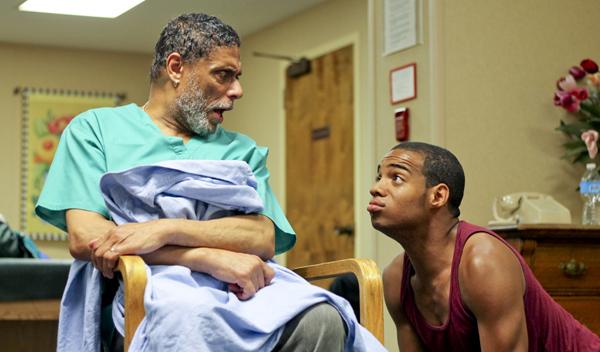
When the lights went up at the Kennedy Center’s Family Theater on Saturday night, a scene between two young boys featured a jarring prop: a gun.
The unsettling scene, which ended with the sound of gunshots, was one in a series of 10 short plays and monologues penned by Maryland prison inmates and featuring a GW senior to appear in the annual Page to Stage series run by the Kennedy Center.
During the two-hour performance of “From Prison to Stage,” senior Maxton Young-Jones played three roles: a six-year-old child fiddling with a handgun, a young man grappling with sexual assault and a talking German shepherd, for which he crawled around on all fours.
“At the very beginning, it really, really hits you how serious [the content] is. After you keep rehearsing, you forget how impactful it is, then you remember all over again once you perform it live,” Young-Jones said. “All of the feelings sort of come out. You do it even if it hurts you because it’s important.”
“From Prison to Stage” began as a play written by inmates in the Maryland Correctional Institute for Women in Jessup, Md.
Director Betty May was commissioned to help the inmates write a comedy about life in prison to teach children from the inmates’ mistakes, but she wanted to present the content in an honest way.

“The kids don’t need comedy, they need honesty,” May told the inmates.
With May’s help, the finished scripts present visceral accounts from convicts, including a scene featuring a prisoner tormented by sadistic guards.
Young-Jones, a dramatic literature major, said the heavy material shifted his perception of the incarcerated and their treatment.
“A lot of these people should be in prison, but we don’t think about them,” Young-Jones said. “We don’t provide for their needs in an adequate way.”
May heard stories from prisoners firsthand and shared anecdotes about their lives with the actors to help them connect with the people they portrayed.
Young-Jones also informed his acting by reading prisoners’ unedited scripts and studying their original syntax.
“We read their original plays to figure out what had been changed, what their mental stage was, because it’s very useful to know what they were thinking while they were writing it,” Young-Jones said.
The emotional commitment was accompanied by an intensive rehearsal schedule, which demanded daily three-hour rehearsals in the two weeks leading up to opening night.
Dennis Sobin, director of Prisons Foundation, an organization focused on enriching prisoners’ lives through art, helped bring the inmates’ scripts to life after May submitted their drafts to him.
Sobin said he hoped the show highlighted the experiences of society’s marginalized.
“People are affected by public opinion, but they’re not affected by what the inmates say within the prison,” Sobin said. “Now [inmates] have a voice in the world.”
– Allison Kowalski contributed to this report.








